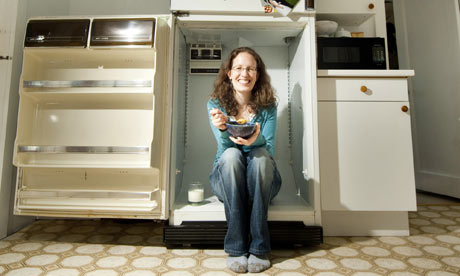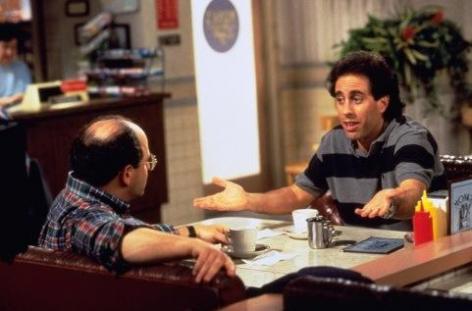Wobbler
New Member
http://www.guardian.co.uk/environment/2009/feb/19/living-without-fridge-greenNo fridge? Cool!
Doing without a fridge is a badge of honour for some green activists. But how do they cope? And how much does it help? Steven Kurutz reports
- Steve Kurutz
- The Guardian, Thursday 19 February 2009
- Article history
Rachel Muston and her decommissioned fridge in Ottawa. Photograph: Colin Rowe/NYT
For the last two years, Rachel Muston, a 32-year-old IT worker for the Canadian government in Ottawa, has been taking steps to reduce her carbon footprint - composting, line-drying clothes, installing an efficient furnace in her three-storey house.
About a year ago, though, she decided to "go big" in her effort to be more environmentally responsible. After mulling the idea over for several weeks, she and her husband, Scott Young, did something many would find unthinkable: they unplugged their fridge. For good. "It's been a while, and we're pretty happy," Muston says. "We're surprised at how easy it's been."
As drastic as the move might seem, a small segment of the green movement has come to regard the refrigerator as an unacceptable drain on energy, and is choosing to live without it. Muston estimates that her own fridge, which was in the house when they bought it five years ago and probably dates back much longer, used 1,300kWh per year, or produced roughly 2,000lbs of CO2 - the same amount from burning 105 gallons of petrol. And even a newer, more efficient model would have used too much energy, she says, "because I'm getting along fine without one".
Muston now uses a small freezer in the basement in tandem with a cool box upstairs; the cool box is kept cold by two-litre soft drink bottles full of frozen water, which are rotated to the freezer when they melt. (The fridge, meanwhile, sits empty in the kitchen.)
She acknowledges that living this way isn't always convenient. For starters, it has altered the couple's eating habits. "When we had the fridge, we were eating a lot of prepared food from the grocery store," she says. But the cool box has limited room, and the freezer is for meat and vegetables. Without the extra storage, Muston finds herself cooking more - which requires more time and forethought because items from the freezer must be thawed.
Asked whether the couple have had to give up any cherished foods, Muston sighs. "Cold beer," she says. "Scott can't come home and grab a cold beer out of the fridge any more. He has to put it in the cooler and wait an hour."
For the most part, though, the couple seem to have made a smooth transition to life without a refrigerator. Yet many environmentalists - even those who think nothing of using recycled toilet paper or cut the thermostat to near-arctic levels - see fridge-free living as an extreme choice or an impractical goal.
"The refrigerator was a smart advance for society," says Gretchen Willis, 37, an environmentally conscious mother of four in Arlington, Texas, who recently read about the practice on the internet, and was astounded. Although she's committed to recycling and using fluorescent bulbs, she says she draws the line at any environmental practice that will result in great expense or inconvenience. Living without a refrigerator, she says, qualifies on both counts: she would have to buy more food in smaller quantities because of spoilage, prepare exact amounts because she couldn't refrigerate leftovers, and make daily trips to the grocery store.
Deanna Duke, who lives in Seattle and runs eco-themed blog thecrunchychicken.com, says that taking a stand for or against unplugging has become "a badge of honour" for those on either side. "It's either 'look how far I'm willing to go', or 'look how far I'm not willing to go'," she says. For her part, Duke is firmly in the pro-refrigerator camp. "The convenience factor is too high," she says.
No-fridge advocates see things differently. They trade tips on websites about food storage ("In the winter I put perishables like mayonnaise outside . . .") and cite residents of developing countries and US blogger Colin Beavan, the self-proclaimed No Impact Man who ditched his refrigerator during the year that he tried to make no net impact on the environment, as proof that people can get along fine without electric refrigeration. Meanwhile Veneta Cucine, the Italian kitchen company, has unveiled a concept kitchen called the iGreen, which has no refrigerator but instead uses trays under the countertop to hold fresh produce.
People who do best without a fridge often have certain built-in lifestyle advantages - they live alone and don't have to cook large meals for a family, say, or they live on a farm or within walking distance of the shops. In the case of Duncan Campbell, who has been living happily without a fridge for three years, it was his diet.
Before making the switch, Campbell, 53, already hewed to long-life staples such as beans and grains, and had begun to can the vegetables he grows in the garden behind his house in Columbus, Ohio. By using a small chest freezer for fruit and leftover soups, he says he has no trouble whipping up a meal. The one thing he hasn't been able to adjust to is the reaction from friends. "Even people I meet who are energy conscious gasp when they hear I'm going without a fridge," he says.
A bigger issue for serious environmentalists may be figuring out just how much good one is actually doing by unplugging the fridge - a common problem with green-oriented lifestyle choices. Pascale Maslin, the founder of Energy Efficiency Experts, a Washington-based company that conducts energy audits on homes and other buildings, says people may focus undue attention on the refrigerator's energy consumption simply because they often hear - incorrectly, it turns out - that it is the household appliance that uses the most energy other than heating and air-conditioning systems. "If I was to examine my life and ask what would reduce my carbon footprint, I would say stop eating meat," Maslin says. "That's much more significant than unplugging your fridge." Others point out that doing so is likely to result in more trips to the shops (which burns more fuel, for those who drive) and the purchase of food in smaller portions (thus more packaging).
Nevertheless, both Muston and Campbell say they have no plans to plug their fridge back in now that they've adjusted to life without it. "I realise it's not a big deal in terms of energy use," Campbell says, but "it doesn't change my mind. I don't like the hum of the thing, and I've discovered I don't need it."

